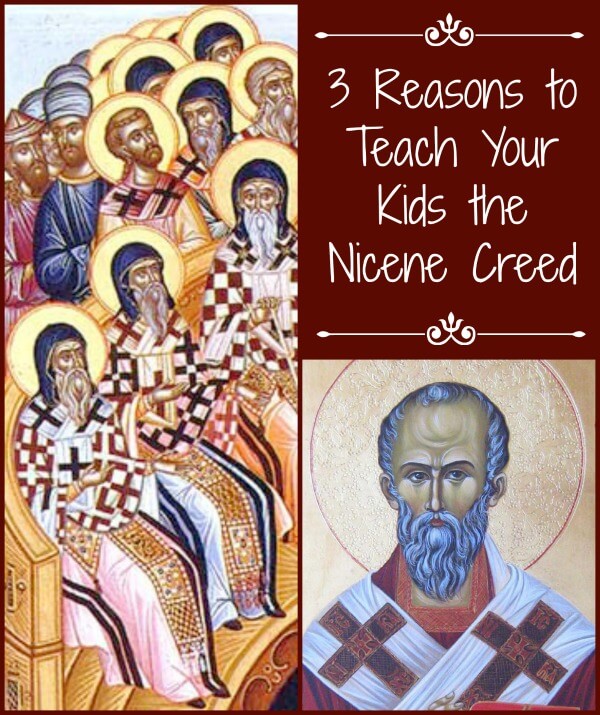The Nicene Creed is the most widely used profession of faith in church liturgies and statements of faith around the world. The Creed, as we currently have it, is the result of two church councils: the First Council of Nicaea (AD 325) and the First Council of Constantinople (AD 381).

Some in the church see no value in church councils—they espouse “No Creed but Christ, no Book but the Bible.” However, it should be noted that in the earliest centuries of the church there was no established list of canonical books. The list of the 27 inspired New Testament books, as we have them today, was first put together in a pastoral letter by Bishop Athanasius of Alexandria in the year AD 367—this was 42 years after the Nicene Creed was first written. While the church at large had general agreements about the inspiration of many New Testament books before these church councils, no formal list was created.
Some churches want to do away with ancient creeds altogether, but Carl Truman rightly remarks,
…there is surely no virtue in turning our backs on those forms of sound words that have done a good job for hundreds of years in articulating aspects of the Christian faith and facilitating its transmission from place to place and generation to generation. If you want to, say, reject the Nicene Creed, you are of course free to do so; but you should at least try to replace it with a formula that will do the job just as effectively for so many people for the next 1,500 years. If you cannot do so, perhaps modesty and gratitude, rather than iconoclasm, are the appropriate responses to the ancient creed.
Why, as a parent, do I want my kids to wrestle with and understand the Nicene Creed?
1. It Teaches Them to Think Critically About Bible Interpretation
Heresies have always threatened the church, even from its earliest days. By the fourth century, the most influential heresy was Arianism, named after its originator Arius. Arius was a popular priest from Alexandria, Egypt, whose teaching had challenged Alexander, the Bishop of Alexandria. Their debate was centered on this question: What does it mean for Jesus to be God’s Son? What was the Father’s relationship to the Son before the world began?
Arius believed that God the Father’s divinity is greater than the Son’s, and that the Son is the Father’s first and greatest creation. In other words, the Son is not co-eternal with the Father and is not, thereby, divine in the same way the Father is. To support his teaching, Arius appealed to texts like John 14:28 where Jesus says, “the Father is greater than I,” and Colossians 1:15, where Paul teaches Jesus is “the firstborn of all creation.”
The Nicene Creed was the church’s answer to Arianism. By teaching our kids this creed, we give them practice in Biblical interpretation. What does it mean for the Son to be “begotten”? What does it mean that Jesus is the Father’s “firstborn”? What does it mean that “the Word was with God, and the Word was God” (John 1:1)? These are the questions the councils wrestled with, and these are the same questions that can stretch our children’s minds and help them to think critically.
2. It Teaches Them to Appreciate Christian History
The Council of Nicaea in 325 is perhaps one of the greatest achievements in Christian history. The emperor Constantine called together church bishops from around his empire, and 318 of them (according to most early historians) arrived in Nicaea to discuss this theological matter that threatened to divide the church. For one month (from May 20 to June 19), the Bishops deliberated, and in the end all but two of the Bishops signed the creed. Another council convened 56 years later in Constantinople to bring further clarity to the creed.
Learning some of these old stories helps our children to appreciate their Christian heritage and the challenges the early church faced.
3. It Teaches Them to Appreciate Church Unity
The Nicene Creed is still the most widely used profession of faith in church liturgies and statements of faith, used by Roman Catholics, Eastern Orthodox, Anglicans, and many Protestant churches.
The Catechism of the Catholic Church says the Nicene Creed is “a sign of recognition and communion between believers.” Martin Luther’s Small Catechism names the Nicene Creed as one of the approved creeds of the church. It is written in full in the Anglican Book of Common Prayer and in hymnals of Presbyterian denominations.
Books About the Nicene Creed
Books for Elementary Ages: These books make great read-alouds or can be read by older elementary school students.
- Athanasius, by Simonetta Carr
- Against the World: The Odyssey of Athanasius, Henry W. Coray
- Peril and Peace: Chronicles of the Ancient Church, by Mindy Withrow
“Living Books” for Older Students: Want some primary sources? These ancient church compilations are great reading to introduce your high school student to the Nicene Creed.
- Athanasius: Select Works and Letters (free)
- Socrates and Sozomenus Ecclesiastical Histories (free)
- The Seven Ecumenical Councils (free)
Using Handwriting to Teach

The Nicene Creed:
I believe in one God
The Father Almighty,
Maker of heaven and earth,
And of all things visible and invisible;
And in one Lord Jesus Christ,
The only-begotten Son of God;
Begotten of his Father before all worlds,
God of God, Light of Light,
Very God of very God;
Begotten, not made;
Being of one substance with the Father;
By whom all things were made:
Who for us men and for our salvation
Came down from heaven,
And was incarnate by the Holy Ghost
Of the Virgin Mary,
And was made man:
And was crucified also for us under Pontius Pilate;
He suffered and was buried:
And the third day he rose again
According to the Scriptures:
And ascended into heaven,
And sitteth on the right hand of the Father:
And he shall come again, with glory,
To judge both the quick and the dead;
Whose kingdom shall have no end.
And I believe in the Holy Ghost, The Lord, and Giver of Life, Who proceedeth from the Father and the Son;
Who with the Father and the Son together
Is worshipped and glorified;
Who spake by the Prophets:
And I believe one Catholic and Apostolic Church:
I acknowledge one Baptism for the remission of sins:
And I look for the Resurrection of the dead:
And the life of the world to come. Amen.










I was really interested in this curriculum and offer. I thought it was free for 30 days. Did I miss the limited time offer?
It’s still free! Just follow the directions at the bottom of this post – go like our facebook page and you can grab BOTH the manuscript and cursive for free there. If you already like us, just click on the box that says “Hey Fans, click here for a freebie!”
Thanks for your patient response. I found it. :o) Have a blessed Resurrection Sunday.
Thanks for this! My son is working through the Apostles Creed right now and I was just telling him that he was going to learn the Nicene next even if I have to make the pages myself! Now I don’t need to. 🙂
Wonderful! Glad this can be a blessing to you. Were you able to download them from our facebook page for free?
oh yes! Thanks
If it is truly free, why do one has to like your Facebook page. This is not really free in my opinion. It has a condition added to it.
Hi Misty,
We probably should have been more clear in our email. By “free” we meant that you didn’t have to pay money, just simply like our page on facebook. Of course, you can always unlike our page after you get the freebie, but we really do appreciate if you continue to follow us there. Building our social media networks enables us to get more sponsors, which further enables us to create more products like these to give to everyone 🙂
Blessings from a Catholic brother in Christ. Thank you for supporting this holy creed that is being abolished by so many. Peace.
Thanks, Dillon. I personally believe the Council of Nicaea is one of the great achievements in Christian history. Glad you like this post!